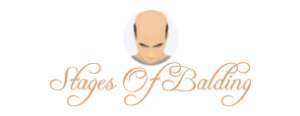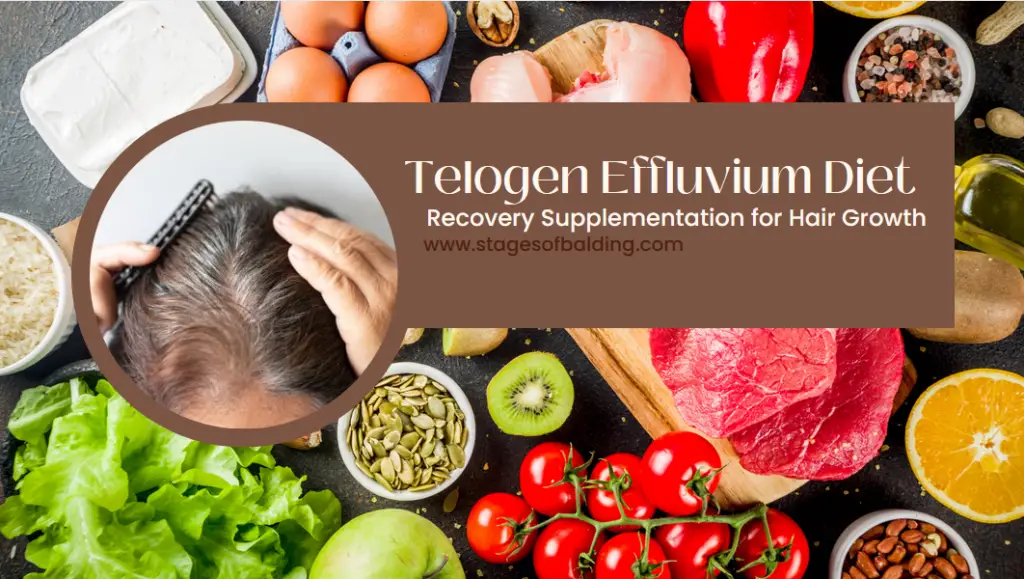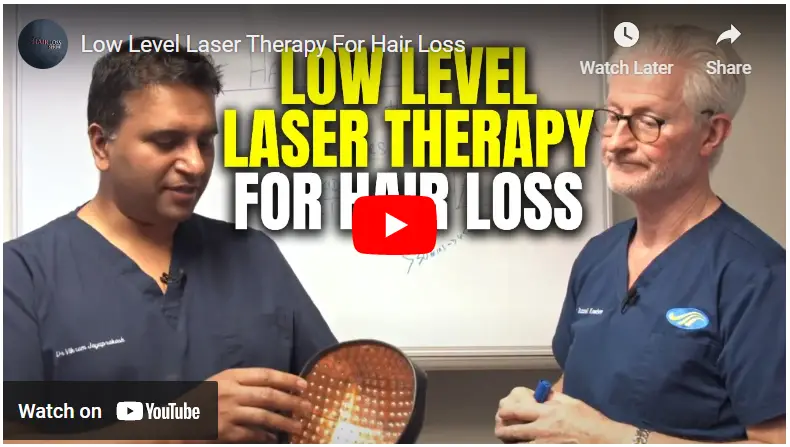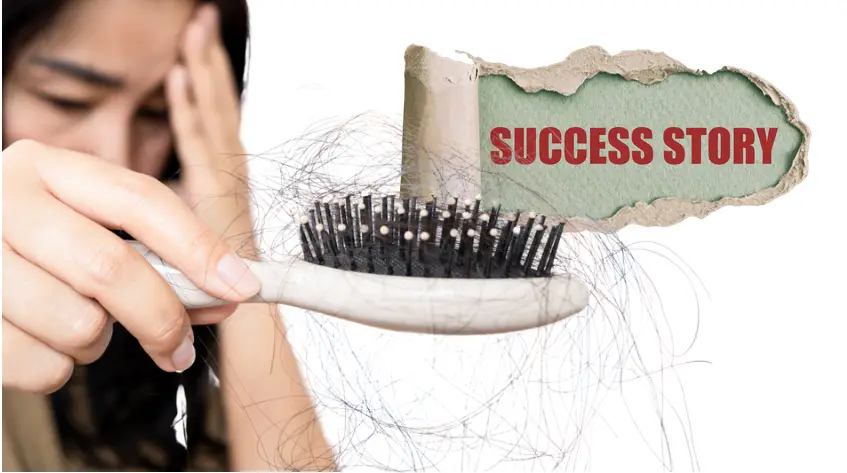Dealing with hair loss can be an overwhelming experience, especially when it’s caused by Telogen Effluvium. The good news is that your diet plays a significant role in maintaining your hair health and fighting this condition.
In this comprehensive blog post, we’ll delve into the causes of Telogen Effluvium and how specific nutrients support hair growth. Read on to learn crucial tips for incorporating a beneficial diet and discover additional resources to help prevent or manage this common type of temporary hair loss effectively.
Understanding Telogen Effluvium And The Role Of Diet In Hair Health
Telogen Effluvium is a type of temporary hair loss triggered by various factors such as stress, severe illness, diet or a traumatic event; while diet plays a significant role in promoting hair growth and preventing hair loss.
Definition And Causes Of Telogen Effluvium
Telogen Effluvium is a scalp disorder characterized by excessive shedding of hair, making it one of the most common causes of alopecia. It occurs when a significant number of hair follicles on the scalp are pushed prematurely into the telogen (resting) phase, resulting in sudden and increased hair loss. This condition can be triggered by various factors including stress, hormonal changes, nutrient deficiencies, medications, illness, or surgery.
Although Telogen Effluvium is poorly defined with limited research available, several known causes have been identified to contribute to this type of temporary hair loss. Among them is the physical or emotional trauma that disrupts normal hair growth patterns; underlying medical conditions like thyroid disorders and anemia; drastic weight loss or crash dieting leading to nutritional deficiencies such as low iron levels; childbirth and menopause affecting hormonal balance; and certain medications including antidepressants, blood pressure medications and nonsteroidal anti-inflammatory drugs (NSAIDs). By understanding these potential triggers for Telogen Effluvium, individuals can take proactive steps toward managing their risk factors and maintaining healthier hair.
How Diet Affects Hair Growth And Health
A well-balanced diet plays a crucial role in maintaining healthy hair and promoting hair growth. Consuming the right nutrients not only strengthens the hair follicles but also prevents various types of hair loss, including telogen effluvium. Nutrient deficiencies, particularly iron, zinc, and vitamin A, can weaken your hair at the root level leading to increased shedding.
On the other hand, diets rich in protein can encourage better health for both scalp and strands as it is an essential component for producing new keratin – a key structural material that makes up our hair fibers. Additionally, consuming foods high in iron such as red meat or dark green leafy vegetables is pivotal in preventing anemia which has been linked to telogen effluvium – a temporary form of stress-induced alopecia characterized by excessive amounts of hairs entering their resting phase prematurely.
Lastly, practicing mindful eating habits like avoiding crash dieting and ensuring a sufficient intake of vitamins B12 & D through supplements or natural food sources will contribute towards overall improved wellness while reducing chances of experiencing aggravated stages of telogen effluvium altogether. So whether you’re looking to fortify your tresses from within or aiming to treat existing thinning issues head-on (pun intended), incorporating wholesome dietary guidelines into daily life should be considered an integral part of any effective approach against unwelcome shedding episodes triggered by this common yet often misunderstood condition called telogen effluvium.
Nutrients That Promote Hair Growth And Prevent Hair Loss
Eating a nutrient-rich diet is key to promoting healthy hair growth and preventing further hair loss in telogen effluvium patients. Learn about the essential nutrients, including protein, iron, vitamin C and more, that can help you achieve healthier looking locks by reading on.
Protein
Protein plays a vital role in maintaining healthy hair, as it is the primary building block of hair follicles. A lack of protein in your diet can weaken the hair structure and even lead to hair loss. Consuming an adequate amount of protein daily helps provide your body with essential amino acids that promote the growth and strength of hair.
Incorporating a variety of protein-rich foods into your telogen effluvium diet can make a significant difference in preventing further hair loss and promoting regrowth. Opt for lean sources such as chicken, turkey, fish, eggs, tofu, beans, lentils, or low-fat dairy products like yogurt and cheese. Additionally, supplementing with biotin – an essential nutrient responsible for producing keratin – can bolster both the effectiveness of these proteins and overall support for healthier locks. By prioritizing nutrients like these within your meal plan, you’ll be taking a proactive approach against telogen effluvium while fostering stronger strands from root to tip.
Iron
Iron is one of the essential nutrients for promoting hair growth and preventing hair loss. Iron deficiency has been associated with Telogen Effluvium, making changes to the diet that include iron-rich foods may help reduce hair shedding. Women with an iron deficiency are especially at risk of hair loss due to poor nutrition.
A lack of iron in the body can slow down hair growth and even cause temporary hair loss. This happens because the body uses iron to produce hemoglobin, a protein responsible for carrying oxygen throughout the body, including the scalp’s blood vessels. Without enough oxygen delivered to your scalp, your follicles receive less nourishment which makes them weaker and more prone to fall out. To ensure optimal nutrient intake controls inflammation levels in your scalp eat more red meat like beef or turkey as well as lentils, spinach, pumpkin seeds or quinoa – all excellent sources of dietary iron.
Incorporating foods rich in iron into your daily diet can make a significant difference when it comes to treating Telogen Effluvium . Other critical nutrients that promote healthy hair include protein, vitamin C + antioxidants lysine,selenium B-vitamins Zinc omega-3-fatty acids biotin.To stay ahead of any nutritional deficiencies consider adding supplements such Tress Anew Natural Hair Growth Supplement which contains a combination of vitamins and minerals important for overall health now let’s move on to other vital elements towards managing Telogen Effluvium through Diet!
Vitamin C And Antioxidants
Vitamin C plays a key role in promoting hair growth and preventing hair loss related to telogen effluvium diet. This essential nutrient has strong antioxidant properties that can protect the scalp from oxidative stress caused by free radicals, which can damage hair follicles and lead to shedding. Berries like strawberries, blueberries, and raspberries are excellent sources of vitamin C, making them an ideal addition to your diet if you’re concerned about hair health.
Antioxidants also play a vital role in maintaining healthy hair by blocking the release of TGF-β induced by DHT. This neutralizes it and prevents further damage that could lead to further shedding. Foods rich in antioxidants include nuts, green tea (check out Super Green Matcha), tomatoes, spinach, pumpkin seeds – all these foods should be incorporated into your diet for optimal results when dealing with telogen effluvium-related hair loss or other forms of temporary or prolonged alopecia. Getting enough antioxidants is important not only for protecting our overall health but also for promoting healthier-looking locks.
Omega-3 Fatty Acids
Omega-3 fatty acids are essential to promoting hair growth and preventing hair loss related to telogen effluvium diet. These healthy fats can be found in fish like salmon, sardines, and herring, as well as in flaxseeds, chia seeds, and walnuts. These foods are great sources of omega-3s that can help reduce inflammation in the body which is important for maintaining healthy hair growth.
A deficiency of fatty acids like omega-3 and omega-6 can trigger hair loss related to telogen effluvium. Therefore it is important to incorporate these essential fats into your diet through food or supplements. If you struggle with incorporating enough whole food sources into your diet then supplementing with a high-quality Omega-3 fatty acid supplement could also be an option. With consistent intake of Omega 3’s this will promote stronger healthier hair roots resulting less shedding(1).
To maintain healthy and luscious locks when experiencing Telogen Effluvium consider including foods rich in Omega-3 Fatty Acids such as Salmon, Chia Seeds or Walnuts part of your regular meals plan.(2)
Lysine
Lysine is an essential amino acid that plays a crucial role in hair growth and maintenance. It stimulates the production of collagen, which makes up a significant portion of hair follicles. Additionally, lysine assists in iron absorption, and iron deficiency can lead to hair loss. This amino acid also aids in the metabolism of zinc, which is necessary for healthy hair growth.
Foods rich in lysine include meat, fish, eggs, beans, and lentils. Vegetarians or vegans can obtain lysine from quinoa or pumpkin seeds. People who are experiencing telogen effluvium may benefit from increasing their intake of these foods or taking L-lysine supplements.
Incorporating enough lysine into your diet can help promote healthier hair growth and prevent further hair loss caused by nutrient deficiencies. Consulting with a healthcare professional before starting any supplementation regimen is always recommended to ensure it aligns with individual dietary needs and medical conditions.
Biotin
Biotin, also known as vitamin B7, is an essential nutrient that plays a crucial role in promoting hair growth. Studies have shown that biotin deficiencies can lead to hair loss and thinning. Incorporating foods rich in biotin such as eggs, nuts, and whole grains into your diet can help promote healthy hair growth.
Another option for increasing your biotin intake is through supplements like biotin gummies. These supplements come in delicious flavors and are easy to incorporate into your daily routine. However, it’s important to note that taking excessive amounts of biotin supplements may lead to unwanted side effects or interactions with other medications you may be taking.
Consulting a healthcare professional before starting any new supplement regimen is always recommended to ensure optimal health outcomes.
Zinc
Zinc is a crucial nutrient for maintaining hair health, and its deficiency has been linked to hair loss. This mineral helps in the production of scalp oil, which prevents hair from drying out and breaking off. Zinc also plays a role in building keratin, a protein that makes up the hair structure.
Foods rich in zinc include red meat, poultry, seafood like oysters and shrimp, beans, nuts, whole grains and certain vegetables such as spinach. However pregnant women, alcoholics or those with digestive diseases may be at risk for zinc deficiency because they have difficulty absorbing the nutrient even if their diet is adequate. Therefore it’s essential to get enough zinc through supplementation or increase intake via natural sources to promote healthier hair growth and reduce shedding caused by telogen effluvium.
Incorporating A Telogen Effluvium Diet
Incorporating specific nutrients into your diet can help promote healthy hair growth and prevent further loss in individuals with telogen effluvium – read on to discover the ten tips for managing this condition through dietary changes.
10 Diet Tips To Manage Telogen Effluvium
If you are struggling with telogen effluvium, incorporating a balanced diet can help promote hair growth and prevent further hair loss. Here are 10 diet tips to manage telogen effluvium:
1. Consume foods high in protein, such as chicken, fish, and beans, to support hair health.
2. Increase your intake of iron-rich foods like spinach and red meat to prevent iron deficiency-related hair loss.
3. Incorporate vitamin C-rich fruits like oranges and berries into your diet to aid in collagen production for stronger hair.
4. Add omega-3 fatty acid-rich foods like salmon and chia seeds to your meals to reduce inflammation associated with hair loss.
5. Consume Lysine-rich foods like eggs and dairy products that are important for promoting hair growth.
6. Increase biotin intake by adding nuts, sweet potatoes, or biotin gummies into your diet.
7. Consider supplementing with zinc-rich foods such as pumpkin seeds or taking zinc supplements as it supports healthy hair growth.
8. Include vitamin D sources in your diet such as mushrooms, egg yolks or take supplements which is may reduce the risk of alopecia caused due to a deficiency in this nutrient
9. Avoid crash diets or an imbalanced diet that may lead to nutrient deficiencies and worsen telogen effluvium symptoms
10. Stay hydrated by drinking plenty of water throughout the day as dehydration can affect scalp health leading to issues like thinning hair.
Remember that managing telogen effluvium requires a holistic approach that includes lifestyle changes alongside dietary modifications; these tips will help you get started on the right foot!
Foods To Include In Your Diet
To promote hair growth and prevent hair loss, it’s important to incorporate certain foods into your diet. These foods include:
1. Protein-rich sources such as lean meats, fish, eggs, and legumes.
2. Iron-rich foods like spinach, lentils, and red meat.
3. Foods high in Vitamin C and antioxidants such as berries, citrus fruits, peppers, and leafy greens.
4. Omega-3 fatty acid sources like salmon, walnuts, chia seeds, and flaxseeds.
5. Lysine-containing foods like quinoa, tofu, beans, and nuts.
6. Biotin-rich foods like eggs yolks or biotin supplements like biotin gummies (Biotin is a vitamin that helps keep the hair healthy).
7. Zinc-rich foods such as oysters, beef shanks or nuts
8. Selenium-containing sources like brazil nuts or tuna
By including these nutrients in your diet you can help to ensure that your hair stays strong and healthy while preventing temporary hair loss caused by telogen effluvium from causing permanent damage to your locks.
Foods To Avoid
To manage telogen effluvium through diet, it is important to avoid certain foods that may exacerbate hair loss. Here are some foods to avoid:
1. Sugary and processed foods: These can cause inflammation in the body, which can contribute to hair loss.
2. High-fat and fried foods: These can lead to an increase in sebum production, which can clog hair follicles and contribute to hair loss.
3. Alcohol: Excessive consumption of alcohol can cause nutritional deficiencies and dehydrate the body, both of which can contribute to hair loss.
4. Caffeine: While small amounts of caffeine do not seem to negatively impact hair health, excessive consumption of coffee, tea, and energy drinks can dehydrate the body and lead to nutrient deficiency.
5. Low calorie diets: A lack of calories in the diet can cause nutrient deficiencies that can lead to hair loss.
6. Low protein diets: Protein is essential for healthy hair growth, and a lack of protein in the diet can contribute to telogen effluvium.
7. Dairy products: Some studies suggest that high dairy intake may contribute to hair loss due to hormonal imbalances it causes in some people.
8. Soy: Like dairy products, soy intake has been linked with hormonal imbalances that may exacerbate telogen effluvium in some people.
9. Gluten: Gluten intolerance or sensitivity can lead to gastrointestinal issues that impede nutrient absorption and contribute to telogen effluvium.
10. Certain medications or supplements: Some medications or supplements such as steroids or high doses of vitamin A may promote telogen effluvium or impair healthy hair growth, so seek professional guidance before taking them if possible.
The Role Of Gut Health
A healthy gut is crucial for maintaining overall health and can also impact hair growth. The gut microbiota plays a vital role in limiting factors that lead to hair loss and encouraging the hair growth cycle. Research has shown that changes in the microbiome, diet, metabolites, and immune responses in skin pathologies are related to hair loss.
Incorporating probiotics into your diet can help promote gut health, which in turn may positively affect your hair health. Foods high in prebiotics such as garlic, onions, leeks, and asparagus can also promote good bacterial growth in the gut. In addition to promoting healthy bacteria levels within our digestive system, these foods have also been found beneficial for boosting immunity levels – another key factor influencing healthy hair growth.
Consider Nutritional Supplements
To support hair growth, nutritional supplements such as Tress Anew Natural Hair Growth Supplement could be considered. This supplement contains a blend of natural ingredients like biotin, keratin, and saw palmetto that has been shown to help prevent hair loss and promote healthier hair. While research on the effectiveness of this specific supplement is limited, studies suggest that biotin and other vitamins can improve hair strength and reduce shedding.
It’s important to note that while supplements may help support healthy hair growth, they should be used in combination with a nutritious diet rich in essential nutrients like protein, iron, omega-3 fatty acids, and vitamin C. It’s also essential to consult with a healthcare provider before starting any new supplementation regimen to ensure safety and effectiveness for individual needs. Ultimately, incorporating a balanced diet and considering targeted supplements can play an important role in promoting healthier hair during telogen effluvium recovery.
Tips And Resources For Maintaining A Telogen Effluvium Diet
Learn more about how to manage telogen effluvium with these 10 diet tips, including incorporating foods rich in protein, iron, vitamin C and antioxidants, omega-3 fatty acids, lysine, biotin (Biotin gummies), and zinc. Discover the role of gut health and nutritional supplements like Tress Anew Natural Hair Growth Supplement in promoting healthier hair. Don’t miss out on additional lifestyle changes and professional guidance to maintain a balanced diet for your hair health!
Seek Professional Guidance
For those dealing with telogen effluvium, seeking professional guidance is crucial in managing the condition. A dermatologist can diagnose the cause of hair loss and recommend a personalized treatment plan, including dietary changes and nutritional supplements. They may also suggest medication or topical treatments to promote hair growth.
Additionally, a registered dietitian can provide guidance on developing a well-rounded diet that includes all necessary nutrients for healthy hair growth while avoiding potential deficiencies that could worsen telogen effluvium symptoms. They can offer recommendations for foods high in iron, protein, and omega-3 fatty acids as well as discuss appropriate dosages for any necessary supplements.
It’s essential to work with professionals who have experience in treating telogen effluvium to ensure the most effective management of this condition. By seeking expert guidance from dermatologists and registered dietitians, individuals experiencing hair loss due to telogen effluvium can increase their chances of regaining healthier hair in the long run.
Massage Scalp With Essential Oils
Massaging the scalp with essential oils is a natural and effective way to promote hair growth and improve overall hair health. Here are some tips to get you started:
1. Dilute essential oils before use to avoid irritation. Mix 2-3 drops of essential oil with a carrier oil such as coconut or jojoba oil.
2. Apply the oil mixture directly to your scalp and massage gently for 5-10 minutes.
3. Use circular motions while applying pressure to stimulate blood flow to the hair follicles.
4. Some of the best essential oils for promoting hair growth include peppermint, rosemary, lavender, and tea tree oil.
5. Repeat this process 1-2 times per week for best results.
6. You can also incorporate essential oils into your hair care routine by adding them to your shampoo or conditioner.
Studies have shown that regular scalp massage can improve hair thickness and possibly increase levels of proteins involved in hair growth over time. Combined with a healthy diet and lifestyle changes, massaging your scalp with essential oils can be an effective way to combat telogen effluvium and promote healthier, fuller hair growth naturally.
Medication For Telogen Effluvium
Minoxidil is a medication that can be used for treating telogen effluvium. It is available over-the-counter and comes in the form of a solution or foam that you apply to your scalp. Minoxidil works by increasing blood flow to your hair follicles, which stimulates hair growth.
Another medication that may be prescribed for telogen effluvium is corticosteroids. These medications are typically taken orally and work by reducing inflammation in the body, which can help reduce hair loss caused by this condition.
It’s important to talk to your doctor before starting any new medication for telogen effluvium or any other condition. They can help determine the best course of treatment based on your individual needs and medical history. It’s also worth noting that while these medications can be helpful, they may not work for everyone and there may be some side effects associated with their use.
Telogen Effluvium Treatments Vitamins
Taking vitamins and supplements specifically for hair growth is a common approach to managing Telogen Effluvium. Biotin, also known as vitamin H, plays an important role in strengthening the hair shaft and promoting healthy hair growth. Vitamin C and antioxidants help protect against damage from free radicals that can contribute to hair loss. Omega-3 fatty acids are essential for maintaining healthy scalp tissue and may also reduce inflammation in the body, which can contribute to hair loss.
Other key vitamins for healthy hair growth include iron, zinc, and lysine. Iron deficiency is a common cause of diffuse hair loss in women, so increasing intake through supplementation or dietary changes may be helpful. Zinc helps regulate hormone levels that affect hair growth while lysine supports the production of collagen needed for strong and healthy follicles. Overall, targeted nutritional supplementation along with a balanced diet rich in these key nutrients may help manage Telogen Effluvium-related hair loss effectively.
Lifestyle Changes To Promote Hair Health
If you’re experiencing telogen effluvium or hair loss, there are several lifestyle changes you can make to promote healthy hair growth. Here are some tips:
1. Reduce stress levels: Chronic stress is a leading cause of hair loss, so try practicing relaxation techniques like meditation and deep breathing exercises.
2. Get regular exercise: Exercise improves blood flow, which helps deliver nutrients to the hair follicles, promoting healthy hair growth.
3. Avoid heat styling tools: High temperatures from blow dryers, flat irons and curling wands can damage your hair and lead to breakage.
4. Don’t over-wash your hair: Frequent washing strips the scalp of natural oils that help keep your hair healthy and hydrated. Wash every two to three days instead.
5. Use gentle shampoos and conditioners: Avoid using harsh chemicals on your scalp as they can cause irritation, leading to increased shedding.
6. Quit smoking: Smoking can damage your hair by decreasing blood flow to the scalp and reducing nutrient absorption.
7. Eat a balanced diet: A diet rich in vitamins, minerals, and antioxidants promotes healthy hair growth while preventing nutrient deficiencies that contribute to shedding.
8. Stay hydrated: Drinking plenty of water keeps your scalp hydrated and helps prevent dryness that leads to itching and flaking.
By incorporating these lifestyle changes into your routine along with a telogen effluvium diet plan, you can help promote healthier hair growth while managing telogen effluvium or other types of hair loss more effectively.
FAQs
What is telogen effluvium?
Telogen effluvium is a form of temporary hair loss caused by stress or changes in the body, such as hormonal changes, nutritional deficiencies, and medical conditions.
Can diet affect telogen effluvium?
Yes, eating a hair-healthy diet can help promote hair growth and prevent further hair loss. Nutrients such as protein, iron, vitamin C, omega-3 fatty acids, lysine, biotin, and zinc are essential for healthy hair.
Are there any foods to avoid in a telogen effluvium diet?
It’s recommended to steer clear of highly processed foods and refined sugars as they may cause inflammation in the body. It’s also important to limit alcohol and caffeine consumption as they can contribute to dehydration.
Can supplements help with telogen effluvium?
Supplements containing specific nutrients such as biotin and zinc have been shown to promote healthy hair growth. However, it’s best to consult with a healthcare professional before taking any new supplements.
Can stress be a cause of telogen effluvium?
Yes, stress is one of the common causes of telogen effluvium. Managing stress through techniques such as meditation or exercise may help reduce the risk of experiencing further hair loss.
How long does it take for hair to regrow after telogen effluvium?
In most cases, hair will regrow within six months after the underlying cause has been addressed. However, it may take up to 12 months or longer for some individuals.
Does Telogen Effluvium Change Hair Texture?
While Telogen Effluvium can cause temporary hair loss, there is no specific information indicating whether or not it changes hair texture. The condition typically affects only the anagen phase of the hair cycle, causing hairs to prematurely enter into the telogen phase and then shed. This shedding typically results in thinning rather than a complete alteration of hair texture.
However, other forms of hair loss such as alopecia areata may lead to changes in hair texture due to damage or destruction of the follicle. It’s important to properly diagnose and treat any type of abnormal hair loss promptly with the help of a dermatologist to prevent further complications and promote healthy regrowth.
Conclusion
In conclusion, managing telogen effluvium through diet is an effective way to promote hair growth and maintain healthy hair. By incorporating nutrient-rich foods such as protein, iron, vitamin C, omega-3 fatty acids, lysine, biotin and zinc, while also prioritizing gut health and nutritional supplements like Tress Anew Natural Hair Growth Supplement can help combat the effects of telogen effluvium on your hair.
Remember to seek professional guidance when needed and consider stress reduction techniques along with lifestyle changes to further boost your chances of healthier looking locks. With a balanced diet focused on promoting hair growth and maintaining overall health in mind you too can overcome telogen effluvium!
You Willl Aslo Like:
- AI Powered Bald Filter Online 2024: See Yourself with No Hair! - January 19, 2024
- Harklinikken Bad Reviews 2024: Analyzing Negative Feedbacks - January 18, 2024
- How to Get the Alex Eubank Hair | Step-By-Step Tutorial 2024 - January 18, 2024






